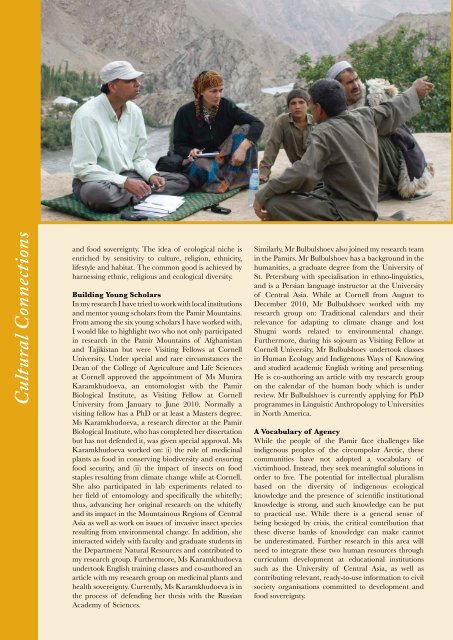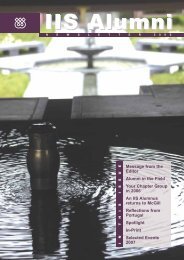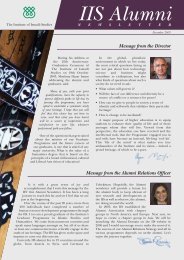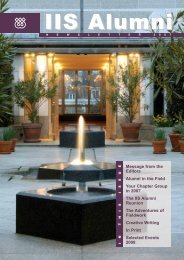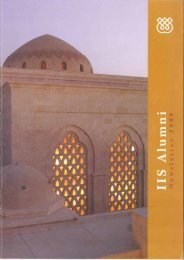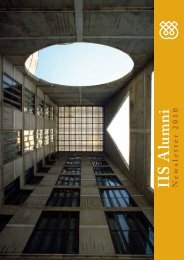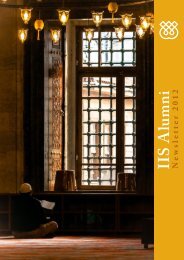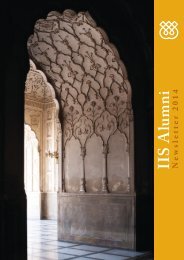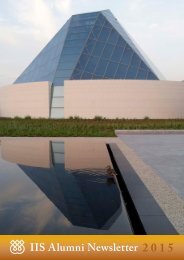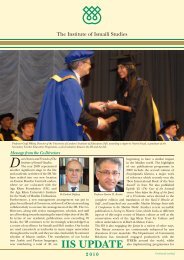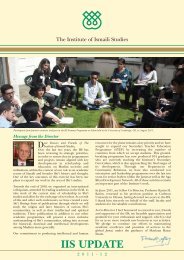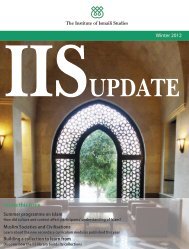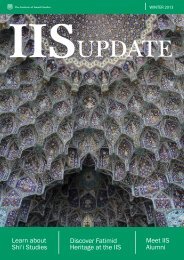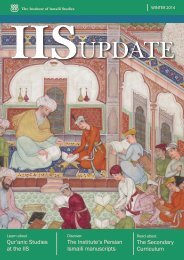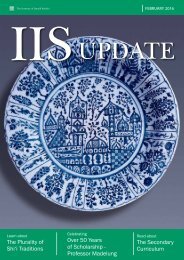IIS Alumni Newsletter 2011
You also want an ePaper? Increase the reach of your titles
YUMPU automatically turns print PDFs into web optimized ePapers that Google loves.
Cultural Connections<br />
and food sovereignty. The idea of ecological niche is<br />
enriched by sensitivity to culture, religion, ethnicity,<br />
lifestyle and habitat. The common good is achieved by<br />
harnessing ethnic, religious and ecological diversity.<br />
Building Young Scholars<br />
In my research I have tried to work with local institutions<br />
and mentor young scholars from the Pamir Mountains.<br />
From among the six young scholars I have worked with,<br />
I would like to highlight two who not only participated<br />
in research in the Pamir Mountains of Afghanistan<br />
and Tajikistan but were Visiting Fellows at Cornell<br />
University. Under special and rare circumstances the<br />
Dean of the College of Agriculture and Life Sciences<br />
at Cornell approved the appointment of Ms Munira<br />
Karamkhudoeva, an entomologist with the Pamir<br />
Biological Institute, as Visiting Fellow at Cornell<br />
University from January to June 2010. Normally a<br />
visiting fellow has a PhD or at least a Masters degree.<br />
Ms Karamkhudoeva, a research director at the Pamir<br />
Biological Institute, who has completed her dissertation<br />
but has not defended it, was given special approval. Ms<br />
Karamkhudoeva worked on: (i) the role of medicinal<br />
plants as food in conserving biodiversity and ensuring<br />
food security, and (ii) the impact of insects on food<br />
staples resulting from climate change while at Cornell.<br />
She also participated in lab experiments related to<br />
her field of entomology and specifically the whitefly;<br />
thus, advancing her original research on the whitefly<br />
and its impact in the Mountainous Regions of Central<br />
Asia as well as work on issues of invasive insect species<br />
resulting from environmental change. In addition, she<br />
interacted widely with faculty and graduate students in<br />
the Department Natural Resources and contributed to<br />
my research group. Furthermore, Ms Karamkhudoeva<br />
undertook English training classes and co-authored an<br />
article with my research group on medicinal plants and<br />
health sovereignty. Currently, Ms Karamkhudoeva is in<br />
the process of defending her thesis with the Russian<br />
Academy of Sciences.<br />
Similarly, Mr Bulbulshoev also joined my research team<br />
in the Pamirs. Mr Bulbulshoev has a background in the<br />
humanities, a graduate degree from the University of<br />
St. Petersburg with specialisation in ethno-linguistics,<br />
and is a Persian language instructor at the University<br />
of Central Asia. While at Cornell from August to<br />
December 2010, Mr Bulbulshoev worked with my<br />
research group on: Traditional calendars and their<br />
relevance for adapting to climate change and lost<br />
Shugni words related to environmental change.<br />
Furthermore, during his sojourn as Visiting Fellow at<br />
Cornell University, Mr Bulbulshoev undertook classes<br />
in Human Ecology and Indigenous Ways of Knowing<br />
and studied academic English writing and presenting.<br />
He is co-authoring an article with my research group<br />
on the calendar of the human body which is under<br />
review. Mr Bulbulshoev is currently applying for PhD<br />
programmes in Linguistic Anthropology to Universities<br />
in North America.<br />
A Vocabulary of Agency<br />
While the people of the Pamir face challenges like<br />
indigenous peoples of the circumpolar Arctic, these<br />
communities have not adopted a vocabulary of<br />
victimhood. Instead, they seek meaningful solutions in<br />
order to live. The potential for intellectual pluralism<br />
based on the diversity of indigenous ecological<br />
knowledge and the presence of scientific institutional<br />
knowledge is strong, and such knowledge can be put<br />
to practical use. While there is a general sense of<br />
being besieged by crisis, the critical contribution that<br />
these diverse banks of knowledge can make cannot<br />
be underestimated. Further research in this area will<br />
need to integrate these two human resources through<br />
curriculum development at educational institutions<br />
such as the University of Central Asia, as well as<br />
contributing relevant, ready-to-use information to civil<br />
society organisations committed to development and<br />
food sovereignty.


